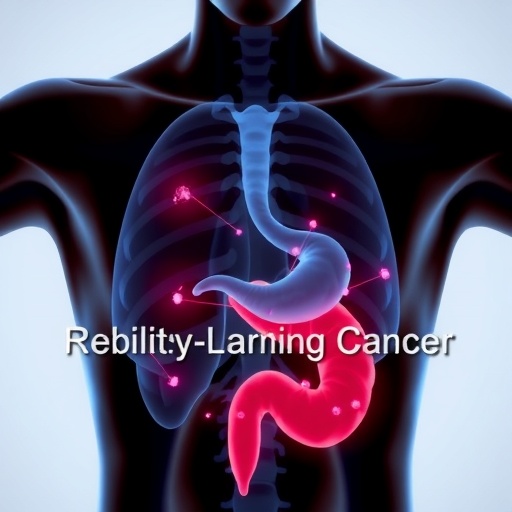In a groundbreaking study published in BMC Cancer, researchers have uncovered crucial molecular predictors that shed light on why certain rectal cancer patients resist neoadjuvant chemoradiotherapy (nCRT), a common preoperative treatment. Despite nCRT being the standard of care for locally advanced rectal cancer, only about 20-40% of patients achieve a complete pathological response. This new research delves deep into the genetic and transcriptomic landscapes of tumors to understand which molecular features dictate treatment outcomes and tumor recurrence.
Neoadjuvant chemoradiotherapy aims to shrink tumors before surgery, improving the likelihood of a successful resection and reducing the risk of metastasis. However, the variability in patient response has challenged oncologists worldwide. The investigative team analyzed genomic and transcriptomic data from 318 pre-treatment biopsies of microsatellite stable rectal cancers, pooling novel samples with available public datasets. This approach allowed for a comprehensive comparison of molecular signatures between tumors that completely responded to treatment and those that did not.
A striking discovery was that patients achieving a complete response (CR) not only showed no residual tumor post-treatment but also had a significantly reduced risk of both local recurrence and distant metastasis. This finding underscores the clinical importance of understanding the biology behind complete response, which could translate into more personalized treatment plans and surveillance strategies for rectal cancer patients.
The study revealed distinct differences in the DNA mutation profiles and gene expression patterns between complete responders and incomplete responders (ICR). Notably, certain mutations tended to co-occur or be mutually exclusive depending on the response group. This suggests that specific genetic interactions may underpin mechanisms of sensitivity or resistance to nCRT.
Moreover, the expression of genes involved in DNA repair pathways was markedly lower in complete responders. This counterintuitive observation points to defective or impaired DNA repair mechanisms potentially making cancer cells more vulnerable to chemoradiotherapy-induced damage, leading to better treatment outcomes. This contrasts with traditional assumptions that efficient DNA repair would enhance cell survival, highlighting the complexity of tumor biology in rectal cancer.
To quantify how these genetic alterations correlate with treatment response, the researchers developed a logistic regression model that accounted for clinical variables such as tumor size, stage, and patient age. The model identified that the presence of particular co-occurring mutations robustly predicted complete response, providing a potential tool for pre-treatment patient stratification.
When examining the tumors of incomplete responders, the team explored the molecular underpinnings of recurrence risk. They found abnormal cell-cell interaction signaling pathways were enriched in tumors that recurred after treatment, suggesting these disruptions may facilitate tumor survival and regrowth. Additionally, an increase in cancer-associated fibroblasts—cells known to support tumor growth and suppress immune responses—was associated with higher recurrence rates.
Beyond cellular interactions, immune profiling uncovered a subset of “immune-hot” tumors among incomplete responders. These tumors exhibited elevated expression of immune checkpoint proteins, markers that tumors exploit to evade immune system attack. Paradoxically, these immune-active tumors correlated with worse outcomes, implying that despite immune infiltration, effective antitumor immunity was compromised, potentially through immune checkpoint-mediated suppression.
Taken together, these findings represent a significant leap forward in understanding the complex molecular tapestry dictating treatment response and recurrence in rectal cancer. They highlight the multifaceted roles of DNA repair deficiencies, mutational landscapes, microenvironment components, and immune evasion strategies in shaping therapy outcomes.
This research paves the way for future clinical approaches that integrate molecular profiling into the management of rectal cancer. By identifying biomarkers predictive of treatment resistance, clinicians could tailor neoadjuvant therapy regimens, escalating or de-escalating treatment intensity as appropriate. Furthermore, strategies targeting cancer-associated fibroblasts or immune checkpoint pathways may improve outcomes in patients at high risk for recurrence.
The implications extend to the development of novel therapeutics aimed at exploiting defective DNA repair mechanisms or reversing immune suppression in rectal tumors. Such targeted interventions could convert non-responders into responders, ultimately enhancing survival rates and quality of life for patients.
In essence, the study reveals that rectal cancer’s response to nCRT is not a simple binary process but rather governed by a dynamic interplay of genetic mutations, transcriptional programs, stromal components, and immune landscapes. This complexity necessitates multifactorial analytical strategies and underscores the promise of precision oncology in this challenging disease.
Going forward, larger-scale validation studies and integration of these molecular predictors into clinical trials are imperative. Understanding how these biomarkers behave in diverse patient populations and across different therapeutic contexts will be critical for their successful translation into routine care.
The authors’ innovative combination of genomic, transcriptomic, and microenvironmental analyses represents a model for future cancer research. It highlights the power of combining big data with sophisticated statistical modeling to unravel the mysteries of treatment resistance and pave the way for personalized medicine.
Published in the 2025 volume of BMC Cancer, this study offers a beacon of hope for rectal cancer patients facing uncertain outcomes. It advances a new paradigm where the molecular constitution of each tumor guides therapeutic decisions, maximizing efficacy and minimizing unnecessary treatments.
In conclusion, these findings constitute a monumental step toward decoding the molecular determinants of neoadjuvant chemoradiotherapy response in rectal cancer. By unveiling the genetic and cellular processes linked to resistance and recurrence, the research opens new horizons for precision diagnostics and targeted therapeutics, promising to reshape the landscape of rectal cancer management.
Subject of Research: Molecular predictors of treatment resistance and recurrence in rectal cancer following neoadjuvant chemoradiotherapy.
Article Title: Molecular predictors of treatment resistance and recurrence following neoadjuvant therapy in rectal cancer.
Article References: Huang, F., McLeod, M.C., Irwin, R.K. et al. Molecular predictors of treatment resistance and recurrence following neoadjuvant therapy in rectal cancer. BMC Cancer 25, 1624 (2025). https://doi.org/10.1186/s12885-025-14958-4
Image Credits: Scienmag.com
DOI: https://doi.org/10.1186/s12885-025-14958-4
Tags: complete pathological response in rectal cancercomprehensive analysis of tumor biopsiesgenetic and transcriptomic landscapes of tumorsgroundbreaking study in cancer researchimproving treatment strategies for rectal cancerlocal recurrence and distant metastasis in rectal cancermicrosatellite stable rectal cancersmolecular predictors of rectal cancer resistancemolecular signatures in cancer treatmentNeoadjuvant Chemoradiotherapy Outcomesoncological challenges in rectal cancer therapyvariability in patient response to treatment





